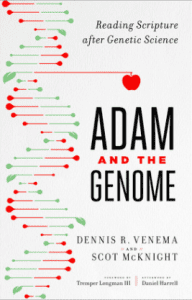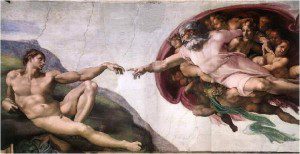Scot has a new book coming out at the end of this month,  Adam and the Genome, co-authored written with Dennis Venema. Dennis is a biologist – and he handles the genome in this book. Scot looks at what this means, or could mean, as we read Scripture. I’ve read or heard parts of these ideas from Scot and Dennis over the last several years and look forward to reading and interacting with the book over the next few months. (You can get more details and read an excerpt here.)
Adam and the Genome, co-authored written with Dennis Venema. Dennis is a biologist – and he handles the genome in this book. Scot looks at what this means, or could mean, as we read Scripture. I’ve read or heard parts of these ideas from Scot and Dennis over the last several years and look forward to reading and interacting with the book over the next few months. (You can get more details and read an excerpt here.)
The Origin of Sin and Death. The question of Adam raises a number of issues for Christians, some are centered on Paul’s use of Adam and his contrast of Christ with Adam: Therefore, just as sin entered the world through one man, and death through sin, and in this way death came to all people, because all sinned … so also through the obedience of the one man the many will be made righteous. (Romans 5:12,19) Sin, death, and victory over death play a crucial role in Christian theology. Some Christians claim that Adam is thus the foundation for the work of Christ. Talk about high stakes! Many others look at the question a little differently. Scot addresses Paul’s use of Adam in the context of first century Judaism in Adam and the Genome.
 The Image of God. But the origin of Sin is not the only issue. Adam and evolution, common descent, also raises the question of human uniqueness. If we are in one lineage with hominoids and other primates. what does it mean to be created in the image of God. Genesis 1 and Psalm 8 bring this to the fore.
The Image of God. But the origin of Sin is not the only issue. Adam and evolution, common descent, also raises the question of human uniqueness. If we are in one lineage with hominoids and other primates. what does it mean to be created in the image of God. Genesis 1 and Psalm 8 bring this to the fore.
So God created mankind in his own image, in the image of God he created them; male and female he created them. God blessed them and said to them, “Be fruitful and increase in number; fill the earth and subdue it. Rule over the fish in the sea and the birds in the sky and over every living creature that moves on the ground.” (Genesis 1:27-28)
what is mankind that you are mindful of them, human beings that you care for them? You have made them a little lower than the angels and crowned them with glory and honor. You made them rulers over the works of your hands; you put everything under their feet: (Psalm 8:4-6)
J. Richard Middleton (an Old Testament Scholar, professor at Northeastern Seminary in Rochester, NY, and author of The Liberating Image (a book well worth reading)) recently addressed the question of evolution and the image of God on a post at BioLogos (Humans as Imago Dei and the Evolution of Homo Sapiens). This is an excellent and thought-provoking post. Richard makes a number of intriguing points. First, the names in Genesis 2-3 (and for that matter many in 4-11) are symbolic. Our English translations obscure this by transliterating rather than translating the names. Generally it is better to transliterate rather than translate proper names, but not in situations like this, where it seems apparent that the meaning is the point.
What are we to make of the fact that the name of the first man is “Human” (’adam) and the name of the first woman is “Life” (havvâ)? And who would name their son Abel (hebel = vapor/futility, the same word that recurs as a theme in Ecclesiastes)? These names are clearly a function of the story (Abel’s life is soon snuffed out). Given the symbolic meaning of the names “Adam” and “Eve,” we may understand the first couple in Genesis 2 as archetypal or representative of all humanity. Given the symbolic meaning of the names “Adam” and “Eve,” we may understand the first couple in Genesis 2 as archetypal or representative of all humanity.
and a footnote that extends this:
This is true also for other characters in Genesis 1-11, such as Cain (= gift), Noah (= comfort), Shem (= name); in each case the name is a function of the story, which suggests that the early Genesis narratives have a legendary quality and should not be taken as descri bing historical events in any simple way.
Second, humans are often compared with or described as created like/with animals in the Old Testament (see the post for some examples). Evolution and common descent is not such a stretch.
Finally, the imago Dei is a calling and vocation rather than a set of unique characteristics. However we came to be, the image of God and all this entails is our God-given role in creation.
Most contemporary Old Testament scholars understand the imago Dei not as certain capacities or features that distinguish humans from other animals, but as a calling or vocation, which involves representing and manifesting God’s presence and rule on earth by the way we live. … Jesus is thus the image of God par excellence (Col. 1:15; Heb. 1:3; 2 Cor. 4:4–6) since he perfectly manifested God’s presence and will in his life, death, and resurrection. And the church, renewed in the image of God, is the new humanity (Eph. 4:24; Col. 3:9–10), meant to continue Christ’s mission in the world.
A good summary of imago Dei is also found in this YouTube video, starting at 9:04-13:21. (The whole talk is great, but this portion is particularly relevant.)
https://youtu.be/RAiggoNskHE?t=9m4s
Richard suggests that the imago Dei requires certain capabilities, but most importantly it requires relationship with God who called us to the vocation of imago Dei. The science of evolutionary biology has no impact on the uniqueness of humans as created in the image of God.
What are the biggest questions in your mind when it comes to Adam, evolution, and human uniqueness?
If you wish to contact me directly you may do so at rjs4mail[at]att.net
If interested you can subscribe to a full text feed of my posts at Musings on Science and Theology.











